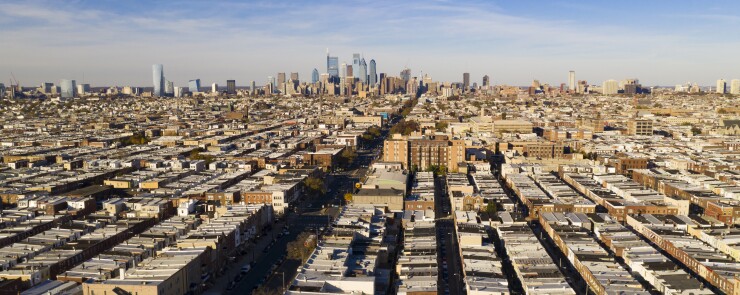The threat of foreclosure has long haunted Lisa Mackenzie.
For the last four years, she has maneuvered through bankruptcy while also struggling to enter a Philadelphia program that would lower her mortgage payments and help her keep the house she bought with her father. It appeared inevitable, though, that her three-bedroom home in Frankford would be put up for sheriff's sale in March.
"I worried all day, every day," she said.
Last week, Mackenzie learned she was among about 20 Philadelphia homeowners who will receive a reprieve from foreclosure. The Pennsylvania Housing Finance Agency is reevaluating its policy that has kept her and others from participating in the city program because they have other outstanding debts. Whether that reprieve will be permanent, though, is unclear.
"I have agreed to not foreclose on anyone until we create a clear path on who we can help and who we cannot help," said Brian Hudson, who until Friday was president of the PHFA.

He said the indefinite moratorium on foreclosures for eligible Philadelphians burdened with liens would continue after his departure from the agency.
The city's Residential Mortgage Foreclosure Diversion program, born out of the recession in 2008, has prevented nearly 14,000 foreclosures by working with lenders and homeowners to lower mortgage payments. In 2019, about 5,000 Philadelphia properties entered foreclosure, according to Attom Data Solutions. That's down significantly from 2010, for example, when more than 12,700 properties reported foreclosure filings.
Mackenzie, 40, bought her home in 2012 for $80,000, with a Federal Housing Administration-backed loan. Those mortgages are made available to lower-income people, among others, according to Hudson.
Dependent on disability payments for 20 years as she raised eight children, she found herself unable to keep up with her mortgage while balancing unexpected expenses, including $2,000 she owed to the Philadelphia Water Department after a pipe on her property burst. In December, she was tentatively accepted into the foreclosure diversion program, which would have reduced her monthly mortgage payments from around $1,000, with fees and penalties included, to $625, a price more manageable than rent for an apartment large enough for her family.
Those lower payments were supposed to begin in March, she said. In the meantime, though, the PHFA, which administers her mortgage, determined she was not eligible for the diversion program because of a $9,000 lien from the Philadelphia Water Department, which she said she accumulated when relatives stayed with her and didn't help her pay the bills.
The PHFA-administered mortgages are backed by the Federal Housing Administration. The Pennsylvania agency interprets federal regulations as requiring that all FHA loans must be the first debt resolved if there is a foreclosure. People with both FHA-backed mortgages and liens must pay off those liens before they can qualify for mortgage modification. The other option would be for the creditors of those liens to agree to step further back in line in the case of foreclosure and allow the mortgage lender to be repaid first.
Pennsylvania state law, though, makes repaying municipal liens like gas and water bills the first priority. Those who might otherwise qualify for foreclosure diversion aren't being given help over unpaid debts like real estate back taxes, medical bills, parking tickets, or water or gas bills. The debts, like Mackenzie's, can be in the thousands of dollars.
Housing advocates and lawyers representing the nearly 20 Philadelphians facing that scenario have fought for the PHFA to interpret the law differently.
"I think ultimately this whole process is questionable and problematic," said John Dodds, director of the Philadelphia Unemployment Project, an advocacy group for the city's poor that is among those trying to help homeowners facing foreclosure. "How many people can come up with that money if they're not working every day?"
Advocates enlisted several state lawmakers to lobby the agency to find some way to keep those people in their homes, among them State Rep. Jared Solomon (D-Philadelphia).
"If you can prevent foreclosure and eviction," Solomon said, "then you, for one person, stop that vicious chain of poverty."
Dodds has suggested that the PHFA simply approve them for the program without worrying about who gets paid first in the event of a foreclosure. The PHFA does offer $1,500 toward liens, but that's not enough to cover the debts some applicants have incurred. The most likely solution would be to modify the mortgages without the FHA acting as insurer, Hudson said. The PHFA itself would assume the risk if the home still ended up in foreclosure.
"I'm looking at the alternative, which means removing FHA," Hudson said. "We have to look at this on a case-by-case basis."
Solomon said he believes every person eligible for the foreclosure diversion program with pending liens eventually will be helped.
Dodds, though, said he's concerned that the PHFA still can't promise assistance to people struggling with their mortgage and liens. When the moratorium ends, he said, he fears there still may be families who will lose their homes.
"I'm just worried we've got a couple families that it's going to be a couple months," he said, "and they're going to be in trouble."




